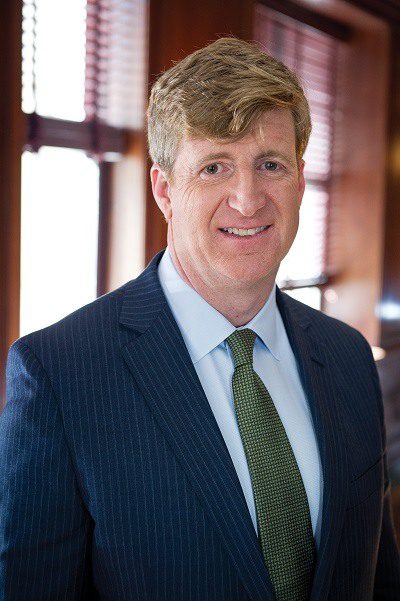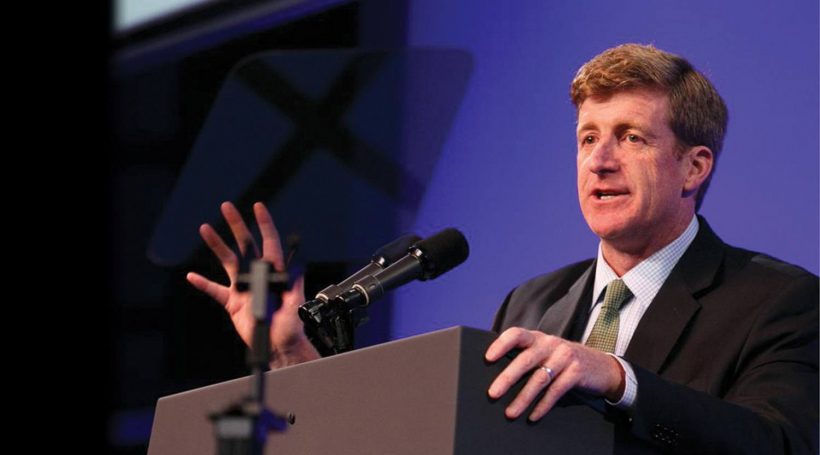At 3 am on a clear, brisk May morning in 2006, then-Congressman Patrick J. Kennedy’s car careened over a Capitol Hill curb and struck a concrete barrier. Officers arriving at the scene found Kennedy disoriented and slurring something about being late for a vote. The last vote of the day had occurred nearly six hours earlier, and officers thought the Representative from Rhode Island seemed clearly intoxicated. But no field sobriety test was conducted, and Capitol Police officers drove him home.
 That began a media feeding frenzy. As reporters rushed to uncover the extent of Kennedy’s substance abuse, his face was plastered on front pages throughout the country.
That began a media feeding frenzy. As reporters rushed to uncover the extent of Kennedy’s substance abuse, his face was plastered on front pages throughout the country.
“It was jarring to have this public humiliation,” the 49-year-old says. “Everyone was trying to get to the bottom of how many different drugs did I have on board, so to speak, and that became the story.”
It wasn’t Kennedy’s first appearance in the court of public opinion over his drug use. The first time he entered treatment for addiction he was 17 and hooked on cocaine.
“When I ran for the state legislature [at 21,] I felt I’d moved on from burning the candle at both ends and living that life of pure hedonism,” says Kennedy, who now lives in Brigantine with his wife and children. “I grew up before my time in terms of my exposure to drugs and alcohol, and I’d decided then to change direction. I was conscious of the fact that this may come back, and ultimately, it did.”
During Kennedy’s second term in the state legislature, his family came under close scrutiny while his cousin stood trial for a rape charge, of which he was ultimately acquitted.
“In all of the digging by the press and of course the gossip columns, the person who had been in treatment with me sold his story to the ‘National Enquirer,’” Kennedy says. “It was daunting – it was right there on the cover – ‘Patrick Kennedy, Coke Addict.’ It took my breath away. I thought, ‘How am I going to survive this?’”
But Kennedy’s political career did survive, and he went on to serve eight consecutive terms in the U.S. House of Representatives. As a politician, he became a champion for those with brain-related illnesses, co-founding the Congressional Down Syndrome and 21st-Century Healthcare Caucuses, and writing legislation that brought mental health into the national conversation.
The irony of Kennedy’s political success is that all the while, he was battling his own chronic mental illness. Though, he says, he’d long kicked the cocaine habit, the alcoholism that plagues his lineage was slowly sneaking up on him, along with a debilitating addiction to prescription drugs and a cocktail of mental health issues – among them depression and bipolar disorder.
The day after his middle-of-the-night accident in 2006, Kennedy held a press conference and told the world about his addiction and his intention to seek help. He checked into the Mayo Clinic in Minnesota, and while his struggle to get sober would continue until 2011, Kennedy sees it as a turning point, both personally and politically.
“I figured it was best to kind of lance the wound and get it over with and get help, and then see whether I couldn’t repair my political career,” he says. “It turned out to be the best thing I could’ve done for my own health, but also turned out to be very good for my political career. I didn’t draw it out. I went and I got the healthcare I needed, and it also put into context the work I’d already done.”
That work came to fruition in 2008 when the Mental Health Parity and Addiction Equity Act was signed into law. The legislation, which Kennedy calls “the medical Civil Rights Act,” requires health insurance companies to provide coverage for the treatment of mental illness on par with the coverage they offer for physical illnesses. Of all Kennedy has accomplished in more than 20 years as an elected official, he says he’s most proud of the Parity Act.
As the youngest son of Rep. Ted Kennedy and the nephew of JFK and RFK, Kennedy was heir-apparent to the family’s political dynasty. He shirked expectations in 2010, less than a year after his father’s death, when he declined to run for reelection. His years out of Congress have continued to be busy. Kennedy travels the country speaking about his own mental health issues and working to implement the Parity Act.

Kennedy appeared at a rally during the 2016 Democratic National Convention
“Insurance companies still deny care for addiction or mental illness in a way they’d never deny care for cancer, cardiovascular disease or diabetes,” Kennedy says.
“It is part of my life’s mission to implement this law I had the honor to author. It’s also about changing the attitudes and misconceptions about these illnesses. I can’t harbor that same shame and fear and silence about these issues while I’m trying to break the silence on a national level. I practice what I preach. I’m telling people these are chemistry issues, not character flaws. They’re medical issues, not moral issues.”
This month, Kennedy’s 2015 book, “A Common Struggle,” will be re-released with an expanded appendix that Kennedy calls “a roadmap for a comprehensive reform of our mental health system.” The book caused a rift between Kennedy and his siblings because the memoir details perhaps the worst-kept secret in American history: the family’s struggles with addiction and depression.
“I told my story, and my parents are my story,” he says. “I can’t tell that unless I tell what it was like growing up in a home where my father suffered the trauma of watching his brothers get murdered. With everything we know these days about PTSD, it’s clear my dad’s at the top of the list of candidates for post-traumatic stress. We had bulletproof vests in all our closets. There were always people threatening to assassinate him as well. There were things we just accepted, but they had a toll, obviously.”
“It’s also about my mother’s debilitating alcoholism, which was passed onto my brother, sister and I,” Kennedy continues. “I felt that sense of shame about these illnesses that my family felt, because that’s what was conveyed to me – you keep these things secret.”
Kennedy says those feelings of shame are a familiar refrain he hears from people suffering from addiction – including, he says, a number of Congressional colleagues who pulled him aside after his public confession – and their loved ones.
“I was writing about the silence around those challenges [my parents] faced, and the fact that we never discussed it,” Kennedy says. “That’s what resonates with most people. Each person may have their own issues with mental illness and addiction, but the one thing that’s the common denominator is the shame and silence. That is the common struggle.”
Kennedy says he’s been sober for five years. He attends daily Alcoholics Anonymous meetings and is in treatment for his mood disorder.
“I have a wife and four children,” he says. “My No. 1 priority is to work every day not to repeat the cycle. I want to be present for them in their lives.”
“Like any parent, I worry about my children falling down the stairs or getting washed over with a big wave on the beach,” he says. “I worry about all kinds of things.”
But he’s serious when he says the silence and stigma surrounding mental health in his family will end with him.
“Every morning they know I go to my meeting – they don’t know what that means yet, but they will,” he says. “They’re going to be at a genetic predisposition to these illnesses, but I think it’ll be a different day and age by the time they grow up. They’ll get a check-up from the neck up at every physician’s visit they have, which will ensure their mental health isn’t ignored, and they’ll be able to credit that to their dad.”













